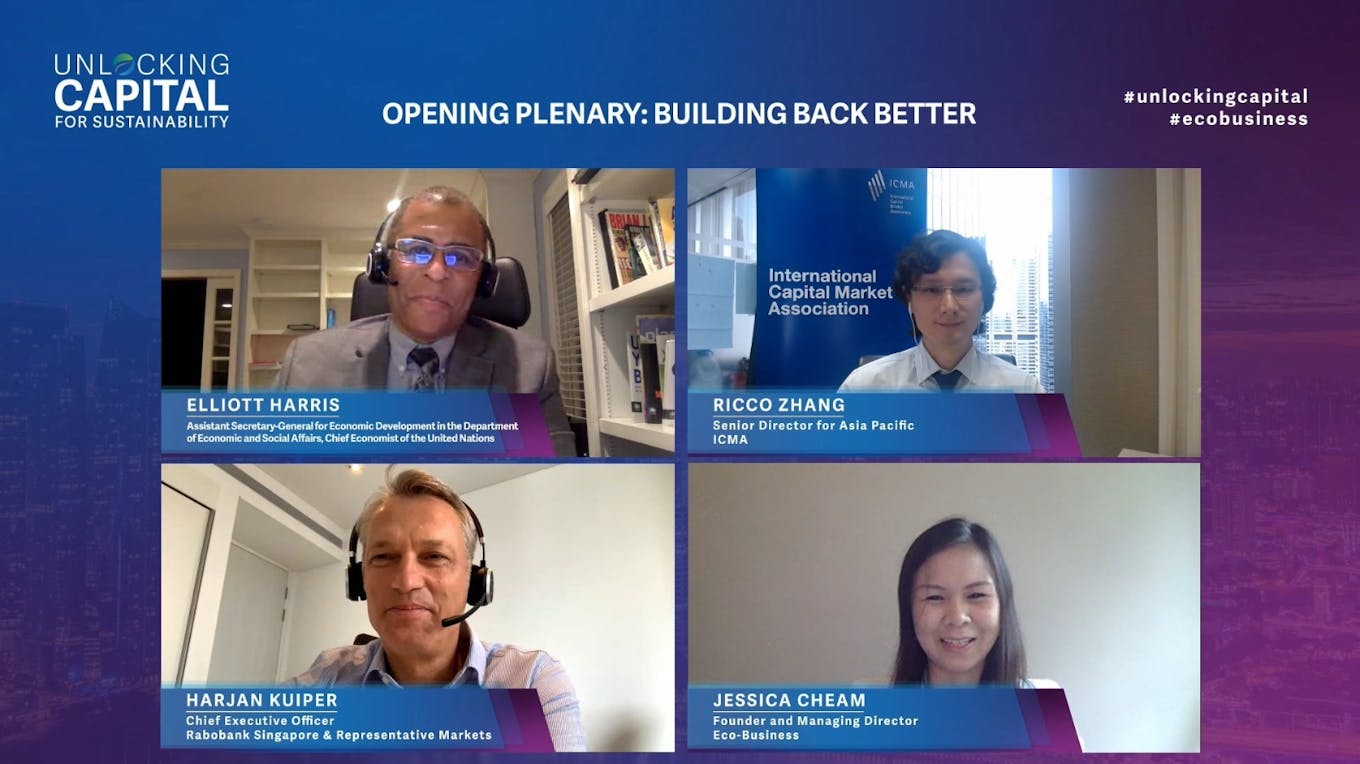Public policies must change to encourage sustainable behaviour and actively discourage unsustainable actions, if the world is to forge a better recovery from the Covid-19 pandemic, said United Nations assistant secretary-general for economic development Elliott Harris on Thursday (10 September).
To continue reading, subscribe to Eco‑Business.
There's something for everyone. We offer a range of subscription plans.
- Access our stories and receive our Insights Weekly newsletter with the free EB Member plan.
- Unlock unlimited access to our content and archive with EB Circle.
- Publish your content with EB Premium.
Even before the Covid-19 pandemic, the world was off-track in achieving the UN Sustainable Development Goals, he said.
This is because public policies have not evolved to match international commitments such as those under the Paris Agreement to cap the rise in global temperatures. Most available resources are still flowing into unsustainable activities such as the burning of coal for energy, Harris said at a virtual conference titled Unlocking capital for sustainability 2020: Building back better, organised by Eco-Business in partnership with the UN Environment Programme.
“It is still possible, unfortunately, to make a good profit doing unsustainable things. And for many, that’s enough of a reason to continue,” he told an audience of financial and business decision makers.
New sustainable activities are also perceived as riskier than traditional activities because there is no universally accepted methodology to assess that risk, and because the externalities of non-sustainable activities are not taken into account.
A third reason for the lack of sustainable investment, is the continuing uncertainty over what actually is a sustainable investment. “And it’s surprising how debilitating that uncertainty still is,” said Harris, who is also the UN chief economist.
“
It is still possible, unfortunately, to make a good profit doing unsustainable things. And for many, that’s enough of a reason to continue.
Elliott Harris, assistant secretary-general for economic development and chief economist, United Nations
The most important change needed for the world to build a better post-pandemic future, is a “clear and predictable stance for policies for sustainability”, he said.

(from top left) Elliott Harris, UN assistant secretary-general and chief economist; Ricco Zhang, senior director for Asia Pacific of the International Capital Market Association; Jessica Cheam, moderator and managing director of Eco-Business; Harjan Kuiper, chief executive of Rabobank Singapore and Representative Markets.
“They include things like sustainable public procurement policies and practices, they entail stepping up investments in sustainable infrastructure. And in today’s world, they should also include efforts to green stimulus packages,” he said.
“The policies against unsustainability are equally self-evident. For example, it’s the elimination of fossil fuel subsidies, and the elimination or reduction of any kind of intervention that could support or encourage unsustainable activities. But it could also be differential tax treatment, imposing higher taxes or higher penalties on activities that are unsustainable. It is the adoption of stiffer environmental regulations. And none of this is new. It’s all a matter of political will.”
At a panel discussion on the progress of sustainable finance in the region after his speech, Harris said a problem lies with the lack of consistency across different actors in the financial markets. Governments can send conflicting messages—for instance, some of the most vigorous champions of the UN’s sustainable development agenda may also be supporters of coal-fired energy. “I think that confuses markets quite dramatically,” said Harris.
‘Right’ response to jobs concerns
An argument governments make for continued investment in unsustainable fossil fuel activities is that they are protecting jobs, but this does not hold water, Harris said in reply to a question from discussion moderator Jessica Cheam.
“It is not the workers whose interests are being protected here because, let’s face the facts, none of us can say exactly on what day the last coal fired power plant will be shut down. But I know it’s going to happen in my lifetime, probably before I retire,” said Harris.
The argument for continued investment in fossil fuels plays to a legitimate concern on the part of those whose jobs are threatened, he added. “But that is not the right response. The right response is to provide support for people to shift away from these activities that have no future, and move into one that can continue to generate a livelihood for them for a longer period of time.”
“
It is not the workers whose interests are being protected here because, let’s face the facts, none of us can say exactly on what day the last coal fired power plant will be shut down. But I know it’s going to happen in my lifetime, probably before I retire.
Elliott Harris, assistant secretary-general for economic development and chief economist, United Nations
Acknowledging that not everyone will be able to transition to a new-economy role, Harris said this is why governments’ Covid-19 response must include social protection measures.
Another panellist, Ricco Zhang, senior director for Asia Pacific of the International Capital Market Association, said governments are aware of the need to shift to low-carbon energy, but probably want to take a gradual approach. “Maybe in the next five or 10 years, I think this will happen,” Zhang said.
An encouraging sign in China—the world’s largest producer and consumer of coal—is the central bank’s new consultation draft of its green bond catalogue which, for the first time, removes “clean coal” and fossil fuels from the list of investments for which green bonds can be issued, he noted.
A fellow panellist, Harjan Kuiper, chief executive of Rabobank Singapore and Representative Markets, called for greater investment in technology to decarbonise the food and agricultural sector. A significant proportion of agricultural emissions, mostly those from livestock farming, “cannot be stopped with current technologies”, he said.
Mobilising green finance for SMEs
The mobilisation of finance for the greening of small and medium enterprises, which has received little attention to date, was another issue raised during the discussion.
The investment needs of small enterprises are usually too small to attract large investors, and Harris said banks could play a major role in helping small companies develop investment plans that are bankable. These plans could then be consolidated into an investment vehicle large enough to draw the attention of capital markets, he said.
Zhang agreed that banks play an important role in channeling sustainable finance to small and medium companies to encourage them to meet their climate obligations. In addition, many governments in Asia have tools such as taxes and other incentives to nudge small and medium firms towards sustainability, he said.
Urging policymakers to pursue a sustainable recovery, Harris said: “I would encourage policymakers to take the difficult decision. We will support you. You needn’t worry.”












